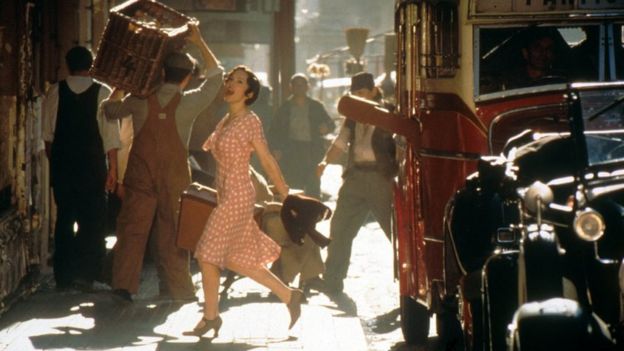Andrew Lloyd Webber: My career in 7 songs
 EPA
EPA
"I'm maybe a bit of an oddball in Britain," says Andrew Lloyd Webber, "but all my life I've loved musicals".
"I just love the form. I love the genre."
It's a love affair that's turned him into one of the most successful theatre composers of all time.
From Joseph and Jesus Christ Superstar all the way up to his latest hit, School of Rock, he's been a permanent presence on Broadway and the West End for almost 50 years - picking up seven Olivier awards, seven Tonys, four Grammys, and an Oscar along the way.
On 22 March, he turns 70, marking the occasion with a star-studded, four-disc retrospective album and the first volume of his autobiography. But he's not too bothered by the birthday brouhaha.
"I'm one of those people who likes to move forward," he confesses. "I find looking backwards all the time gets a bit much."
Prolonging the torture a little longer, we asked Lord Lloyd-Webber to reflect on seven songs that defined his career.

Superstar, from Jesus Christ Superstar
The iconic fanfare that opens Superstar almost never made it into the musical, says Lord Lloyd-Webber.
"Two days after I thought of it, I'd forgotten it," he says. "Then it came back to me when I was walking past a restaurant in Fulham.
"I knew the guy who ran it, so I went in and said, 'can I borrow a napkin?'. And I wrote the tune down because I didn't want to forget it again!
"I remember the moment very, very well."
The 15-note phrase spawned a thousand imitations and more than a few playground parodies. Does he have a favourite? Yes, he does.
"Georgie Best, superstar," the composer recites, poker-faced. "Walks like a woman and he wears a bra."

Music of the Night, from Phantom of the Opera
Music of the Night started out as a love letter to Sarah Brightman, written when Lloyd Webber was still with his first wife, Sarah Hugill.
With remarkable candour, the original version was called Married Man.
"I thought it was really a very good song," the composer later told David Frost, "[But] everybody said to me, 'Andrew, you cannot write a song about a girl having an affair with a married man and expect to get away with this'."
Accordingly, it was stored away in Lord Lloyd-Webber's "tune bank", and resurfaced when he embarked on writing Phantom Of The Opera.
"You can't do that very often," he says. "For example, I've got probably 20 tunes in my head at the moment and none of those tunes - not one of them - would work remotely for the subject that I'm intending to do next.
"The most important thing to remember with a musical is you're the servant of the story."
In the end, Married Man became Music of the Night, which the Phantom sings to seduce the object of his affections, Christine Daae.
"Yes, much to Sarah's annoyance, the song was given to the Phantom," Lord Lloyd-Webber laughs.
"She still, in her concert, sings it sometimes and says, 'I'm going to reclaim the number that was originally written for me'."

Any Dream Will Do, from Joseph and the Amazing Technicolor Dreamcoat
In the summer of 1967, Andrew Lloyd Webber was asked to write an original piece for the choir of St Paul's Junior School to sing at their Easter concert.
"The original brief was that it could be sung by children - their voices had got to be able to cope with it," Lord Lloyd-Webber recalls. "But I didn't compromise anything."
The composer immediately approached his friend Tim Rice for help with the lyrics. They initially toyed with the idea of writing a Bond spoof (You Only Live Twice had just hit the cinemas) before Rice suggested the biblical story of Joseph, whose ability to interpret dreams helps save Egypt from famine.
The first performance took place on a cold winter afternoon in March 1968. It lasted just 20 minutes but the seven-song "pop cantata" launched one of Lord Lloyd-Webber's most enduring songs - Any Dream Will Do.
"It was a simple song written, obviously, with children in mind," he says of its naive, nursery rhyme-like melody.
"It was meant to inspire children to sing. We didn't ever think it would make the theatre, because we didn't write it for the theatre.
"And, even today, Joseph is the most popular show in schools and colleges across America, which is pretty extraordinary."

Another Suitcase in Another Hall, from Evita
 REX SHUTTERSTOCK
REX SHUTTERSTOCK
Sung by Juan Peron's mistress after his wife, Eva, throws her out on the streets, Another Suitcase in Another Hall was originally recorded by Barbara Dickson on a concept album that preceded the stage version of Evita.
In the studio, Rice and Lloyd Webber asked the Scottish star to sing at a higher pitch than she was used to, so she'd sound young and fragile, like her character.
"We were trying to make an album that would make sense if you were listening to it at home, without the stage production around it," says Lloyd Webber.
"So with that song, she obviously had to sound like a young girl.
"Barbara has this lovely low timbre, but she was very willing to give it a go. And I think that that's what makes it work."
The song became a Top 20 hit in the UK after being named record of the week on BBC Radio 1 - marking a brief moment where Lord Lloyd-Webber's productions were considered "cool".
"I think that might have been a little bit of an exception, even then," he says, modestly. "You have to understand that. in Britain, musicals have always been [outside] the mainstream.
"But I have had big hits from musicals, as other people have. No Matter What, from Whistle Down the Wind, was number one for Boyzone. So it's not impossible."
Madonna also took Another Suitcase in Another Hall into the top 10 in 1997 after claiming the song for Eva Peron in the film version of the musical.
"Madonna annexed it," deadpans the composer.

Magical Mr Mistoffelees, from Cats
Cats was the first musical Lloyd Webber wrote without a lyricist, basing the story around poet TS Eliot's Old Possum's Book of Practical Cats, which he read as a child.
"Up to that time, I'd mostly written the music first, then the lyrics were set to it," he says. "I wanted to see if I could do it the other way round. And, as it happens, Magical Mr Mistoffelees was one of the first ones I did.
"The thing about Eliot's verse is it almost sings to you. I mean, the verse of that [poem] seemed quite funky to me and then you have the chorus with, 'Oh well, I never / Was there ever a cat so clever / As magical Mr Mistoffelees'.
"Those poems are almost like lyrics. They've got choruses and they've got verses and they've got middle sections. It was a joy to set it to music."

As if We Never Said Goodbye, from Sunset Boulevard
Based on Billy Wilder's film of the same name, Sunset Boulevard tells the story of ageing silent screen goddess Norma Desmond.
As if We Never Said Goodbye comes late in the show, as Desmond imagines her dramatic return to the screen. The audience's knowledge that she's deluding herself lends the song its lingering melancholy.
"That's a fantastic moment for a musical dramatist," says Lord Lloyd-Webber.
"When I first saw the movie of Sunset Boulevard I thought, 'gosh, if ever I was able to get the rights, that's the moment that really makes it worthwhile."
The song has been performed by Elaine Page, Barbara Dickinson and Patti LuPone, amongst others, but the definitive version is by Glenn Close, who has played Desmond twice on Broadway.
"The interesting thing with Sunset is it's a great bonus for the audience if you've got a movie star in the role, because people relate more to Norma as a movie star than anything else," says Lord Lloyd-Webber.
"The thing about Glenn is that, although she herself wouldn't claim to be the greatest singer on earth, she's probably one of the greatest actresses.
"She makes that moment incredibly special."

Stick it to the Man, from School of Rock
Lord Lloyd-Webber's most recent hit is School of Rock - the story of a feckless substitute teacher who inspires his class by getting them to compete in a Battle of the Bands competition.
It's based on the 2002 Jack Black film, which he was introduced to by his wife, Madeleine.
"When I heard the line in the movie, 'stick it to the man', I thought, 'well, there's a song here'." he recalls. "I had the tune for that in literally seconds."
"It was always going to be a guitar based song. That 'durr-durr, durr-durr' riff takes me back to the days when we were recording Jesus Christ Superstar and we had Led Zeppelin in the studio next door."
The nature of the musical meant that Lord Lloyd-Webber had to find 13 young performers for each production, who each play their own instruments as well as dancing, singing and acting.
"They really, really do play," he says of the highly-impressive casts. "There's no enhancement, no pre-recording, nothing.
"After the first two or three previews, I realised the audience didn't believe that, so I had to make an announcement at the beginning saying 'everything is played live!'."
Andrew Lloyd Webber's retrospective album Unmasked: The Platinum Collection is available now.
No comments:
Post a Comment